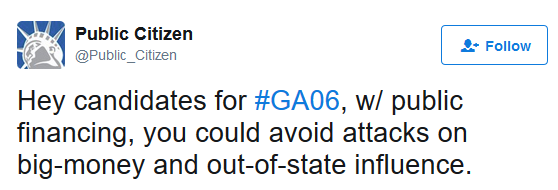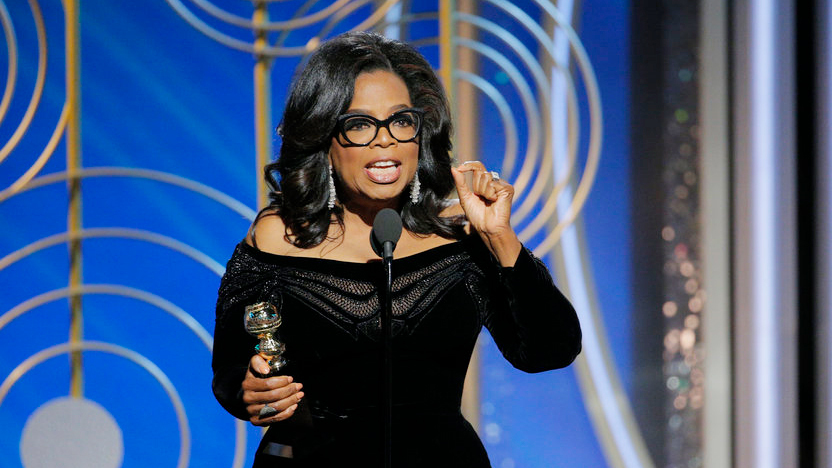The special election for the U.S. House seat for Georgia’s Sixth Congressional District is attracting a great deal of attention from the media. The fact that the race features a relatively large amount of political spending coming from outside the state has been a particularly salient flash point in news articles. Over the weekend, Public Citizen – an organization that favors greater government regulation of political speech – tweeted out a PolitiFact story on this theme. The article covers how the two special election candidates have condemned each other for receiving support from outside of the state.
Public Citizen’s tweet declared: “Hey candidates for #GA06, w/ public financing, you could avoid attacks on big-money and out-of-state influence.”
“Public financing” refers to taxpayer financing of political campaigns – a persistent hobby horse of free speech restrictionists. Would such a system help candidates “avoid attacks” about receiving support from outside the state?
In short, no.
First of all, out-of-state spending is itself no big deal. It reflects the basic fact that federal elections have national implications. Everyone in the country will be affected by the outcome of a congressional election, so why shouldn’t anyone have the ability to participate? That’s why out-of-state news outlets are covering these races to begin with – and themselves spending big money to do so.
Second, public financing wouldn’t stop – or likely even limit – “out-of-state influence.” The Supreme Court has ruled numerous times that it is unconstitutional to limit political expenditures by candidates as well as individuals and groups who do not coordinate with candidates. Even if candidates accepted government subsidies to run their campaigns, it would likely not stop individuals outside the state from spending on ads or contributing to such candidates. Candidates are not likely to decline out-of-state contributions and would be unwise to discourage independent speech. At best, taxpayer financing systems would allow candidates to offset such spending to a degree.
But even attempting to diminish the influence of out-of-state spending through tax-financing mechanisms would be incredibly infeasible. For starters, the Supreme Court has struck down public financing systems that provide “matching” funds to participating candidates when their opponents raise more money than them through private fundraising. This means such systems must offer sufficient funds to everyone more or less equitably.
The amount of money required to completely offset out-of-state spending would also be excessive. Let’s look at a simplified example for offsetting just one Georgia special election candidate with taxpayer dollars. The Center for Responsive Politics said that Democratic candidate Jon Ossoff had raised $8.2 million by April, of which 80% came from outside of the state. That’s about $6.6 million from out-of-state – a lot of taxpayer money to match support for just one candidate in one special election. Those numbers continue to grow too; PolitiFact reported on June 8 that Ossoff had raised $23 million in total. Assuming 80% of that pot still comes from out-of-state, that’s $18.4 million in tax dollars and rising.
In short, if public financing can’t actually stop or offset out-of-state spending, there’s no reason to think it would also stop attacks on those who receive such support.
Third, assuming public financing could insulate candidates from attacks, is this really be the purpose of campaign finance laws? Candidates shouldn’t be able to use taxpayer money to make campaign strategy or messaging easier for them. They serve taxpayers, not the other way around. If candidates really want to take a stand on out-of-state spending, they can return all donations that come from outside the state. Of course, this would be impractical and a waste of resources; a better course of action might be to just embrace such support and explain to the public why demagoguery on this topic is misinformed.
If a candidate is losing the out-of-state spending race, the solution for them is straightforward: they can summon financial support of their own. both within and outside the state. Candidates with a unique, appealing message and a well-run campaign should not have a problem finding direct support or earning independent backing, especially if they represent a major party. Even if politicians cannot perfectly match their opponents’ level of contributions and spending, they still have numerous opportunities to take the case directly to the district’s voters, who can make it known at the ballot box what they think about candidates benefiting from out-of-state support.
What politicians should not do is rewrite campaign funding rules to restrict their opponents, their out-of-state supporters, or, indirectly, taxpayers. There is nothing wrong with national support for a national office, and Public Citizen should not exploit cheap political attacks to push deeply flawed tax-financing programs.
Instead of volunteering Americans’ hard-earned money to protect candidates from attacks, those running for office can instead ask voters to punish those who take out-of-state donations. This would allow Americans to make a choice rather than use the levers of government to compel a specific outcome. But the idea that we should let politicians rewrite the campaign finance system to protect themselves from attacks is ridiculous.














